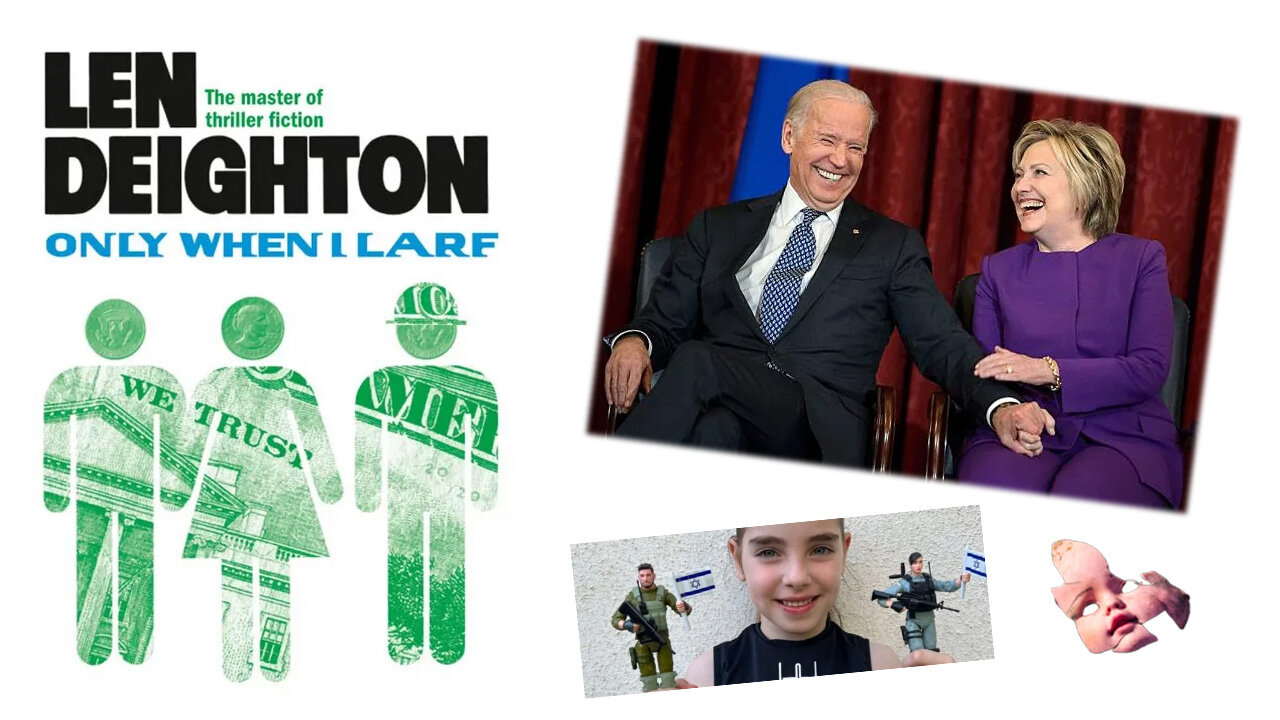Premium Only Content

'Only When I Larf' (1967) by Len Deighton
Len Deighton’s, 'Only When I Larf', is a clever, fast-paced caper novel that marks a notable departure from the author’s more grounded espionage fare. Instead of the smoky corridors of British intelligence, Deighton ventures into the world of high-stakes grift and petty criminality — though, as always, with a sharply ironic eye. At its heart, the novel is a satire of duplicity, a sly exploration of trust, betrayal, and the lies we tell each other — and ourselves — to survive.
The novel centres on a trio of confidence tricksters: the suave and slippery Silas Lowther; his young, eager protégé, Bob; and the seductive Liz Mason, who functions as both accomplice and emotional disruptor. Together, they move from one elaborate scam to another, targeting naïve businessmen, overconfident diplomats, and self-important officials. Each heist is executed with flair, but always shadowed by the unspoken tensions within the trio — chiefly, the romantic and competitive triangle that slowly builds pressure as the narrative progresses.
What sets 'Only When I Larf' apart is its unique narrative structure. The story is told through the alternating first-person perspectives of Silas, Bob, and Liz. Deighton uses this technique not just to provide variety but to subtly reveal the unreliability of all three narrators. Events are described differently depending on who is speaking — what one character calls strategy, another calls cowardice; what one describes as love, another frames as manipulation. As the story unfolds, the reader is invited to question every motive, every statement, and every version of the truth.
In this sense, 'Only When I Larf' is less about the mechanics of con artistry and more about the psychological dance between the players. Each narrator attempts to seize control of the story — to be the hero, or at least the one who comes out on top. But Deighton, always skeptical of heroes, lets none of them off the hook. Their illusions unravel slowly, and the final sting is as emotional as it is logistical.
Deighton’s prose here is crisp, stylish, and laced with dark humour. His dialogue is snappy, often echoing the tone of 1960s British cinema, and he displays a sharp ear for the class distinctions and social posturing of the time. There’s also a certain theatricality in how the cons are described — reminiscent of stage farce or classic film noir — with rooms full of suitcases, double-booked hotel rooms, and mistaken identities. But the farce is undercut by an undercurrent of sadness and futility, particularly as it becomes clear that none of the characters really trusts or even understands the others.
Despite the book’s light tone and comic energy, Deighton still explores some serious themes: the instability of identity, the loneliness of deception, and the strange intimacy of betrayal. Liz, in particular, emerges as a more complex figure than she first appears. Is she being used, or is she the one manipulating the men? Her voice is as dry and self-aware as the others, but she often sees more clearly through the masculine bravado around her. Bob, meanwhile, begins the novel as a naïve apprentice but grows increasingly suspicious and assertive. Silas, the apparent puppet-master, may be the least self-aware of all.
Ultimately, 'Only When I Larf' is a story about the collision between performance and reality. The con artists live by illusion, but their downfall comes not from the marks they trick — but from the false narratives they spin for one another. In a Deighton novel, betrayal is never far away, and the final reversal is less a twist than an inevitability. The sting isn’t just in the wallet — it’s in the heart.
Conclusion: 'Only When I Larf' is one of Len Deighton’s most playful and structurally inventive novels. Though lighter in tone than his spy thrillers, it retains the moral ambiguity and narrative sophistication that define his best work. Through its trio of competing narrators, the novel offers not just a story of con games, but a meditation on truth, ego, and the performative nature of human relationships. At once breezy and biting, 'Only When I Larf' proves that even outside the world of spies and Cold War politics, Deighton remains a master of deception.
-
 1:06:30
1:06:30
LindellTV
1 hour agoMIKE LINDELL LIVE AT THE WHITE HOUSE
10.8K -
 1:05:33
1:05:33
Russell Brand
4 hours agoTrump Goes NUCLEAR on China - accuses Xi of CONSPIRING against US with Putin & Kim - SF627
111K41 -
 1:14:47
1:14:47
Sean Unpaved
3 hours agoTrey Wingo's Gridiron Grab
17.2K1 -
 13:07
13:07
Silver Dragons
21 hours agoBullion Dealer Reacts to SILVER PRICE SURGING!
8.84K5 -
 1:06:28
1:06:28
Timcast
3 hours agoTrump Admin Threatens GOP Who Vote To Release Epstein Files
146K108 -
 2:13:09
2:13:09
Side Scrollers Podcast
4 hours agoDruski/White Face Controversy + Women “Experience Guilt” Gaming + More | Side Scrollers Live
31.9K3 -
 1:39:53
1:39:53
The Mel K Show
4 hours agoMORNINGS WITH MEL K - Narratives Implode as Light Shines on Covid Deception 9-3-25
24.9K7 -
 2:25:56
2:25:56
The Shannon Joy Show
3 hours agoExclusive With Congressman Tom Massie: "The Epstein Files Are NOT A Hoax. There Are Real Victims"
16.6K4 -
 1:52:46
1:52:46
Steven Crowder
6 hours agoCongress Drops New Epstein Files and Trump Drops New Bombs on Venezuela Terrorists
344K199 -
 1:10:39
1:10:39
The Rubin Report
5 hours agoCNN Host Actually Thought She'd Outsmarted Shapiro, Until He Asked This
71.1K48